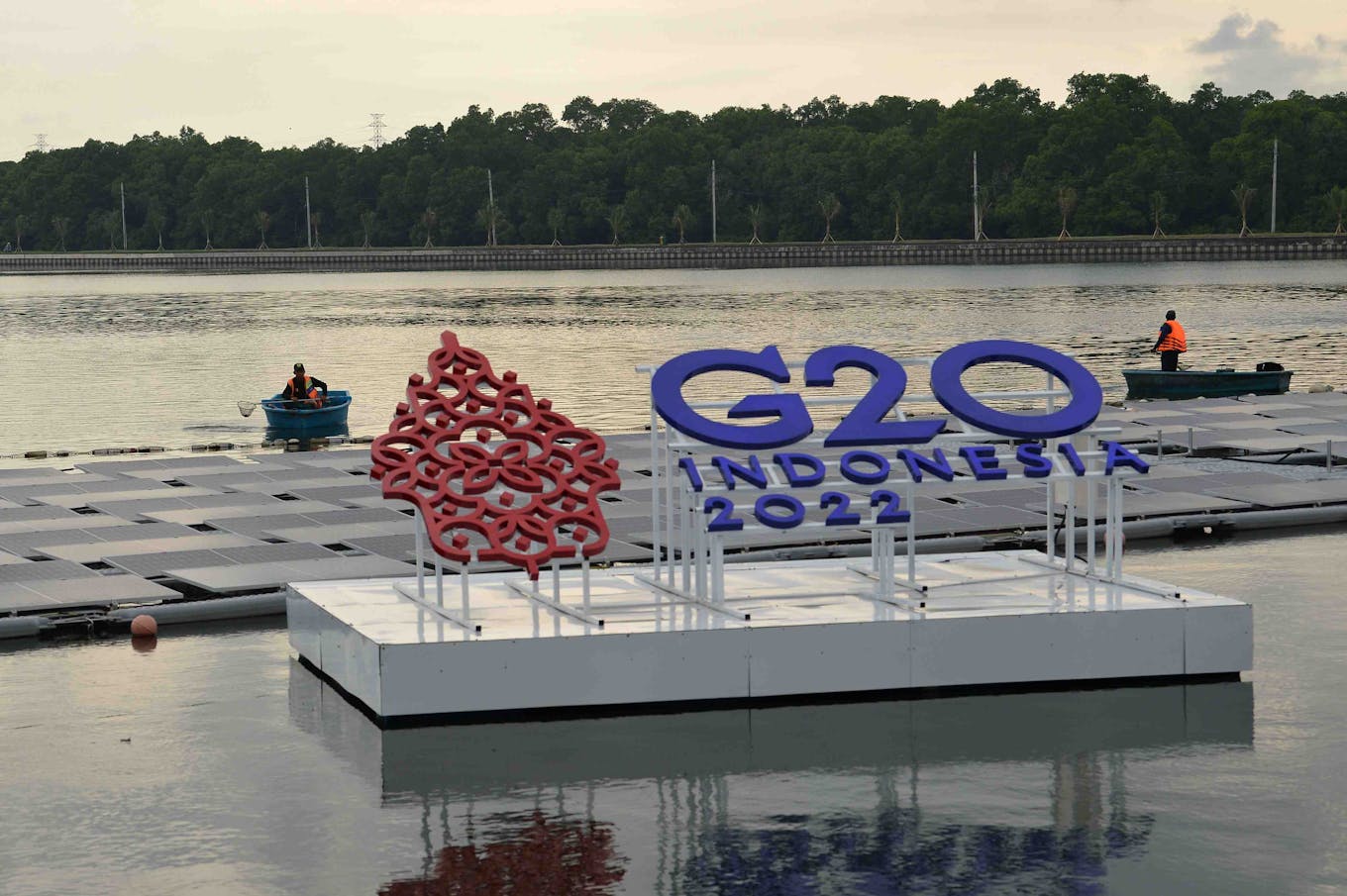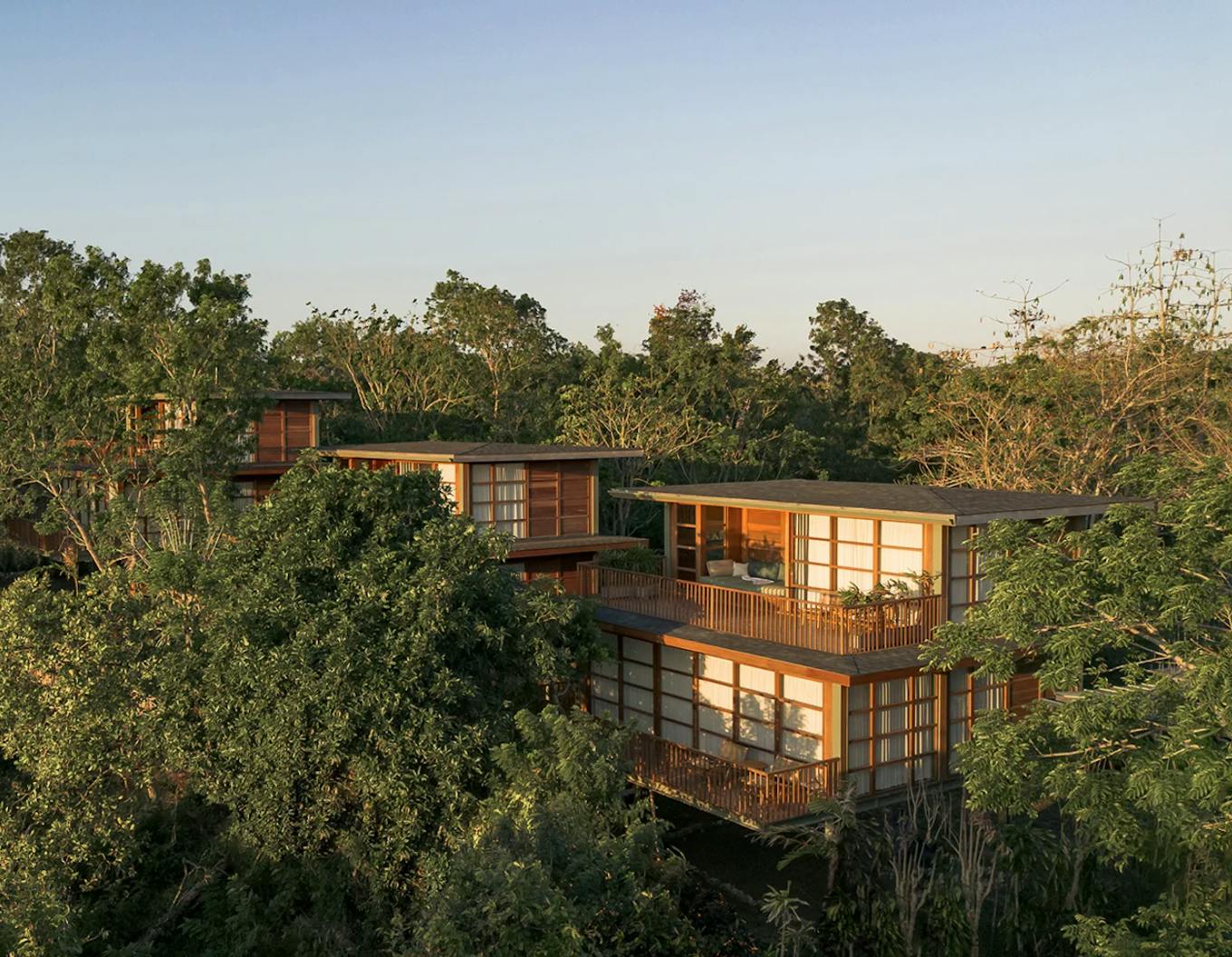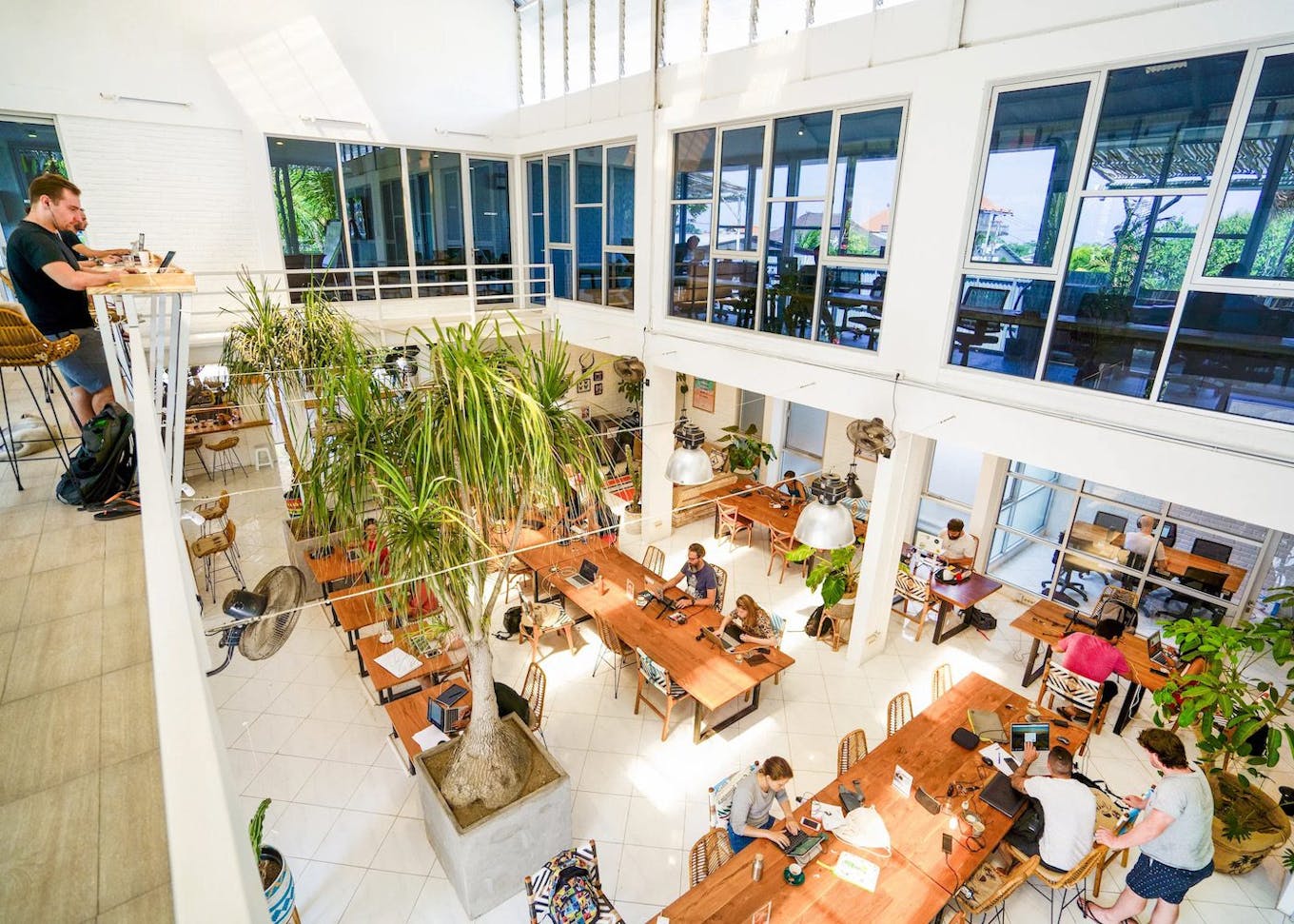The lifting of Covid-19 restrictions in June 2023 brought a tsunami of visitors back to Bali, Indonesia’s “island of the Gods”.
Many of the more than 4 million foreign visitors to Bali in 2023 – up from just 51 at the height of the pandemic in 2021 – were “Bule” surfers headed for Kuta to get sunburnt, guzzle Bintang beer and fall off motorbikes. But a smattering were sustainability entrepreneurs looking to use one of the world’s most beautiful places as a base to pursue their purpose.
Though immigration rules have recently tightened – some suspect in response to a rise in crime and misbehaving foreigners – the island issued 70,000 foreign resident visas in 2022, taking Bali’s population of long-staying non-locals to over 100,000. Many Indonesian entrepreneurs have also relocated from Jakarta to Bali, escaping the air pollution, traffic and high costs of the capital for Bali’s startup hotspots of Canggu and Ubud.
The pandemic was a “big pivot” for Bali, says Lauren Blasco of AC Ventures, a Bali-based early-stage technology venture fund. Blasco, who is head of environment, social and governance (ESG) at the venture capital firm, adds that entrepreneurs who would otherwise set up in Singapore or Jakarta chose Bali, plugging into the island’s half-decent wi-fi and well-equipped co-working spaces as remote work graduated from pandemic-time necessity to accepted business practice.
“
The island needs more big companies doing well to put it on the startup map. Bali needs a Gojek.
Luke Janssen, general partner, Mangosteen Venture Studio
A slew of sustainability-focused events have sprung up to cater to the growing number of startups, says Blasco, who has lived and worked on Bali for eight years. Among them, the Archipelagic and Island States Startup Business Summit in October last year focused on the blue economy and November’s Carbon Digital Conference covered Indonesia’s burgeoning climate economy. Earlier, Bali’s hosting of the G20 Summit in 2022, with its sideline B20 event for businesses, added credibility to an island better known for sun, sea, surf and partying.
Inspirators and aspirators
From hard-nosed investors looking to turn a fast buck from Indonesia’s multi-billion dollar sustainable business opportunity to “woo-woo” fly-by-nighters dabbling in alternative healing and spiritual psycho-babble, Bali is home to a colourful concoction of green startups of all different derivations, sizes and shades of credibility.
“It’s a crazy spectrum,” says Christian Oechtering, a German early-stage investor with an interest in sustainability, wellness, hospitality and psychedelics. “One minute you’re talking to a Russian billionaire building an eco-village, the next a former Amsterdam drug dealer turned life coach.”
There are two types of eco-preneurs in Bali: “inspirators” and “aspirators”, says Oechtering. Inspirators are switched-on entrepreneurs looking to make a genuine difference, aspirators are less credible dreamers living in a bubble – and aspirators outnumber inspirators by two to one in Bali, reckons Oechtering.
“You have to be careful who you work with. You don’t want to squander your time here,” he says.
“Bali is the best place in the world to work from. It’s in such a strategic location and is a place that genuinely empowers entrepreneurship,” says Nicolo Castiglione, an Italian entrepreneur who launched impact-focused angel accelerator Bali Investment Club in 2020. The tropical paradise is starting to earn the “Silicon Bali” nickname it was given about a decade ago, he says.
A natural home for eco-startups?
Bali is a natural launchpad for conscious startups because of its unique cultural identity, says Blasco. Rooted in the island’s philosophy is the saying Nangun Sat Kerthi Loka Bali, which roughly translates to respecting nature and culture to make Bali prosperous. In that sense, new enterprises that work on conserving the island’s natural beauty have a head start, says Toshihiro Nakamura, a former United Nations executive who co-founded Kopernik, an Ubud-based research and development lab for startups working on social and environmental problems.
It helps that the government wants to diversify Bali’s economy beyond tourism. Haunted by the lean pandemic years of empty hotels and barren beaches, when Bali’s economy was hit harder than any province in Indonesia, the local authorities have signalled an intention to attract greener industries and reduce the island’s reliance on tourism, which accounts for 60 to 80 per cent of the local economy.
Under the Kerthi (which means fame and glory in Sanskrit) Economic Roadmap set in 2021, regulations were introduced to boost renewables, electric vehicles and energy efficiency, and build a clean energy ecosystem around Bali’s 2045 net-zero target, Indonesia’s most ambitious provincial decarbonisation goal – 15 years ahead of the national 2060 net-zero target.
Bali is Indonesia’s “net-zero emissions laboratory” and could provide a blueprint for the country’s energy and transport systems, says Sofwan Hakim, senior lead, Bali Programme Management Unit, at non-profit World Resources Institute (WRI) Indonesia. Bali, though still powered by a coal-based grid, can pilot low-carbon solutions and develop infrastructure that can be scaled and adopted across Indonesia, he says.
For that to happen, there is a need for a clear “locally-led” and “science-based” pathway for Bali’s net-zero policy that can serve as a reference point for all climate-related efforts, and for the government and local communities to be equipped with the skills needed to manage the transition, he adds.
There were promising signs that Bali’s net-zero regulations would bear fruit after the G20 Summit in November 2022. In that month, a 100 kilowatt-peak floating solar power plant was launched in Nusa Dua, the upmarket southern tip of Bali where the top luxury hotels hosted visiting G20 dignatories, and the streets were suddenly whirring with electric vehicles (EVs).
But many of the EVs on Bali’s streets for the G20 have returned to Jakarta and the Waduk Muara Nusa Dua floating solar plant, which was billed by an executive from national energy utility PLN as “not merely a showcase for the G20”, is reportedly not operational.

The Waduk Muara Nusa Dua floating solar platform was inaugurated for the G20 Summit in November. The platform is reportedly no longer operational. Image: InfoPublic
Industry-watchers say that Bali’s clean energy regulations, while progressive compared to other Indonesian provinces, have been slow to fulfill their promise. Rayhan Alghifari, policy and advocacy associate at New Energy Nexus, a non-profit that supports clean energy entrepreneurs, notes that there is a lack of follow-up programmes to help clean energy entrepreneurs access incentives, such as tax breaks for converting fossil fuel-based vehicles to EVs and EV charging.
Erlangga Bayu Rahmanda, founder of renewables services firm PT Bintang Terbarukan Indonesia, says that while the government “tends to make a lot of noise” and is fond of ceremonial rhetoric around clean energy, actual programme implementation, monitoring and evaluation have been mostly absent.
To develop Bali’s clean energy ecosystem and help local startups focus on sustainability, Bali needs better research and development infrastructure, which is currently lacking, adds Rayhan. Bali has 10 state universities, and only one, Udayana, has the capacity to support Bali’s clean energy policy. So most eco-startups work on research projects with vocational schools instead. However, of the 177 vocational schools on Bali, only two focus on clean energy, notes Rayhan.
He adds that there is also a lack of technical regulation and incentives to develop solar rooftop power plants on the island, and even a surprising lack of regulation or incentives for sustainable tourism.
Waste to water: Bali’s sustainability startup spectrum
Though there are no major businesses or government offices in Bali, the island is home to some of Asia’s most well established names in sustainable development, mixed in with a new breed of startups that has popped up post-Covid. Kopernik has been around since 2013. Terratai, founded by former Wildlife Conservation Society executive Matthew Leggett, which aims to address a gap in the conservation finance ecosystem in Asia, emerged only last year.
Some are working to fix local problems, with waste being the most popular issue to fill the island’s infrastructure gap for a waste-heavy economy driven by tourism. Environmental group Sungai Watch, which installs river barriers to collect plastic waste before it can enter the ocean, is among the most notable non-profits, founded by Bali-raised French siblings Gary, Kelly and Sam Bencheghib in 2020.

Melati and Isabel Wijsen, co-founders of environmental nonprofit Bye Bye Plastic Bags. Image: TedX on YouTube
Other waste-focused startups in Bali include the award-winning conservation group Bye Bye Plastic Bags. Founded by local sisters Melati and Isabel Wijsen in 2013, their campaigning led to a ban on plastic bags, styrofoam containers and single-use plastic straws in Bali in 2019.
Seven Clean Seas, a waste-based social enterprise, was previously based in Singapore until relocating to Bali in 2022, Bali’s provincial capital Denpasar was the chosen as the Southeast Asia launch hub for plastic recycling firm Prevented Ocean Plastic, while the longer-running recycling firm EcoBali was launched in 2006 – two years before there were any waste management laws in Indonesia.
Products made from alternative materials have emerged as a popular way to tackle Bali’s waste problem. Jakarta-born co-founder Kevin Kumala and business partner Daniel Rosenqvist launched eco-friendly packaging company Avani in 2014, while Indosole, founded by American former sportswear salesman Kyle Parsons after a surf trip to Bali in 2004, makes shoes from recycled tyres.
Electric mobility is a hot topic for entrepreneurs in Bali, an island with underdeveloped public transport infrastructure, which is heavily reliant on polluting private vehicles. Electric scooter rental company Skute and Niu Mobility, the dealer for China-based electric two-wheeler brand Niu, run by entrepreneur Oliver Barker, recently struck a deal with Indonesia’s ubiquitous ride-hailing app Gojek for its riders to use Niu bikes.
The tourism industry consumes a lot of water, with the hospitality sector depriving nearby communities of a reliable water supply. Startups such as Bali Rain, which produces water products from rain water, and Terrawater, a social enterprise which sells ceramic water filters, are working to ease Bali’s water crisis.
Bali’s booming post-Covid real estate sector is ripe for disruption too, as new buildings sprout up all over the island, often with little consideration for the local environment. Founded in 2019 by German hospital entrepreneur Florian Holm, Stilt Studios builds modular prefabricated houses from sustainable construction materials for tourist rentals.

A modular building design in a forest setting designed and built by Stilt Studios. Image: Stilt Studios
The island’s culinary space is bustling with green-minded hospitality entrepreneurs. One of the trailblazers is Jakarta-born, Singapore-based entrepreneur Ronald Akili, who burst on to Bali’s food scene more than a decade ago with Potato Head. The oddly named zero-waste, B Corp-certified brand uses repurposed motor oil bottles as construction panels, industrial rubber waste to make its floors and has crafted a giant statue out of plastic waste collected around the island.

Potato Head’s ‘Pointman - River Warrior’ sculpture is made from plastic waste collected around Bali by the non-profit Sungai Watch. Image: Potato Head on Instagram
Bali is even home to sustainable craft beer brands. Kura Kura, founded by local father and son duo Putu and Kadek Wiranatha in 2020, is locally brewed using preservative and additive free ingredients and is vegan, while Singapore-born Lion Brewery Co, which began brewing in North Bali in 2022, uses aluminium bottles and plants trees for every keg is sells.
Meanwhile, Green School, Asia’s first eco-centric school founded in 2008 by American entrepreneurs Cynthia and John Hardy, is birthing a new wave of Bali eco-preneurs. Seventeen -year-old Freddie Hedegaard started carbon project verification firm Dungbeetle while still at school, supported by Luke Janssen, an entrepreneur who founded Singapore-based mobile technology firm Tiger Spike. Janssen’s latest venture is Mangosteen Venture Studio, a fund that works with underrepresented founders on purpose-driven firms.
Green School alumni include Melati Wijsen, the founder of Bye Bye Plastics Bags. Wijsen has gone on to found Youthtopia, a learning platform for young changemakers. Green School has itself spawned a network of colleges in New Zealand, South Africa and Mexico, and other spin-off ventures in sustainable design and permaculture farming.
Funding gap
While its startup ecosystem has grown rapidly since the pandemic, Bali cannot currently compete with Jakarta or Singapore in one important way: access to capital. As such, although there are countless sustainability-related businesses in Bali, most are small.
IGN Putra Darmagita, chief executive of electric mobility firm Electric Wheel, has said that when he approached Bank BPD Bali, Bali’s regional development bank, for funding, they requested land certificates as collateral. “With limited assets, these requirements are just burdensome,” he said in an interview last year.
Difficulty in finding funding has meant that Bali’s startups struggle to achieve scale. Indosole is one of the few to have gone global, says Castiglione of Bali Investment Club, whose company helped to fund the venture.
After launching Bali Investment Club with an initial focus on Bali, Castiglione now spends more of his time on Jakarta-based ventures that operate across Indonesia. “It’s best to spend one week a month in Jakarta for meetings. There’s so much happening in the capital, the opportunities are almost endless,” he says.
Blasco says that while capital might not be on Bali’s doorstep, as it is in Jakarta or Singapore, with so many people coming in and out, the ‘Island of the Gods’ offers plentiful opportunities to meet the right partners or find the next hire. Plus living and working and Bali is considerably cheaper than Singapore or Jakarta, which helps to keep costs low.
Janssen reckons that more money will shift to Bali from Jakarta as more entrepreneurs move for lifestyle reasons to escape the capital’s air pollution and even more congested roads. The relocation of Indonesia’s capital to Kalimantan could hasten the shift of money out of Jakarta, he adds.
Janssen says that while Bali is an ideal place for pioneering entrepreneurs to be “creative and scrappy”, the island needs more big companies based on the island doing well to raise Bali’s profile.
“Bali needs a Gojek,” he says, referencing arguably the most notable startup in Indonesia’s recent history.
More beach than business?
Entrepreneurs may be put off by the hoards of holidaymakers that swamp the island during peak season. But the island is home to a sizeable number of well-equipped co-working spaces to cater for a growing remote workforce. Tropical Nomad in Canggu is open 24/7. Zin Cafe, also in Canggu, is free with no obligation to buy stuff to hold a place there. Tribal Bali is a hostel and coworking space in one. BWork Bali has free yoga classes for members.

The Tropical Nomad coworking space in Canggu, Bali, is solar-powered, has eliminated single-usage disposable containers and uses biodegradable, natural cleaning products and toiletries. Image: Tropical Nomad
Getting a work visa is a lot easier than in the past, but recently has become trickier. The influx of large numbers of long-staying Russians and Ukrainians since the outbreak of the war has, according to a journalist who prefers not to be named, heightened distrust of foreigners among the locals (a social media post by a Russian man showing himself bearing his buttocks on Mount Agung, considered sacred by locals, stirred particular anger) and the Indonesian immigration department has responded by deporting anyone found to be working illegally on tourist visas or breaking local laws. A taskforce of immigration officers have been working undercover to catch offenders.
“Make sure you have the right visa, otherwise you’ll be on a plane out of here faster than you can say ‘bye-bye paradise’”, says one sustainability executive who also witheld his name. “But as long as you respect the culture and comply with the regulations, you’ll be left alone,” he says.
Foreign entrepreneurs who intend on staying and working on Bali, as opposed to fly-by-night digital nomads using the island as a temporary remote workplace, need a work permit (see here for the latest details) – a business visa won’t cut it.
Also crucial to ensuring a long stay in Bali is working with locals. “The foreign entrepreneurs who make it in Bali are empathetic and smart, and tap into the local culture,” says Oechtering.











